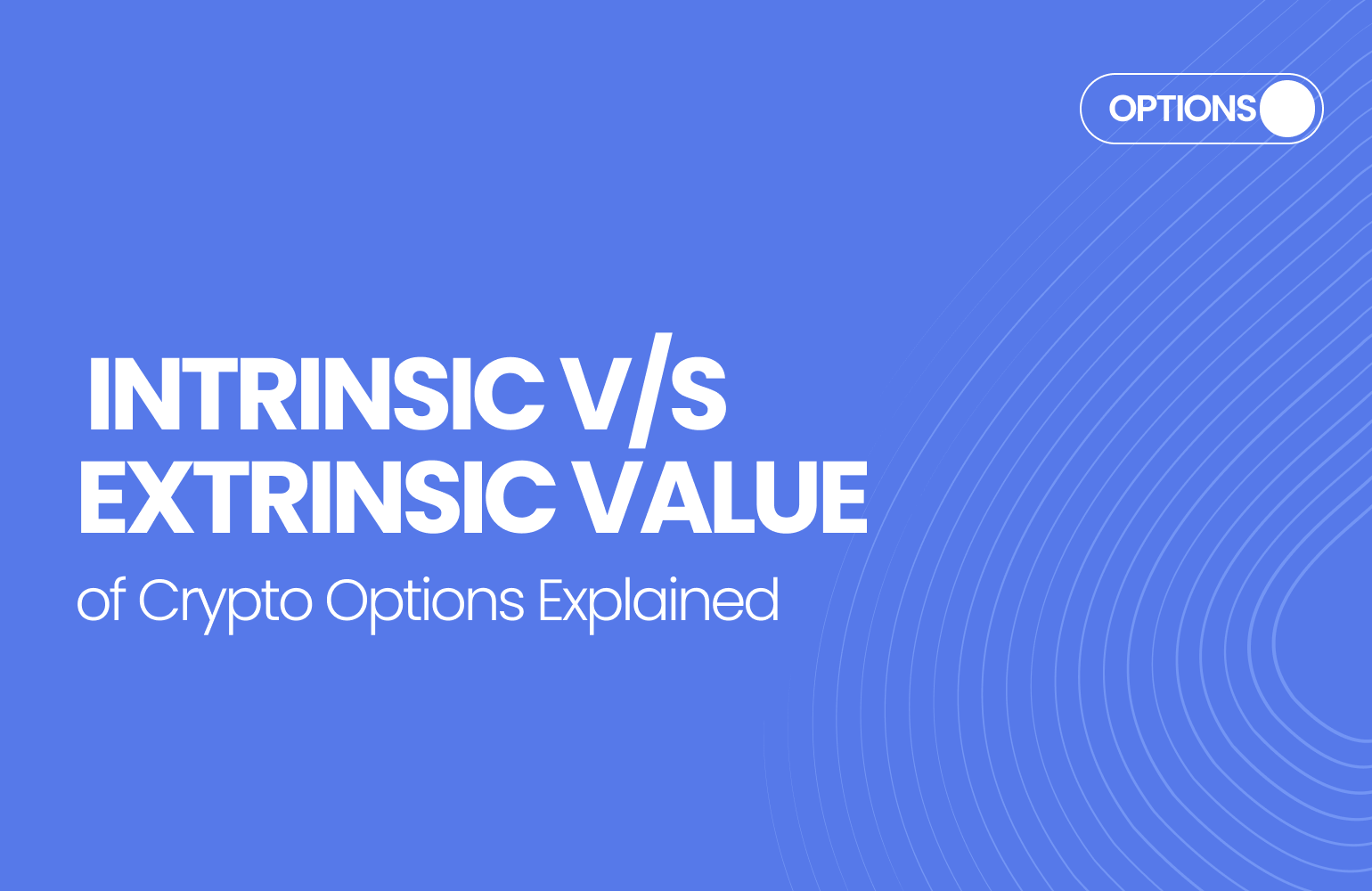Key Takeaways:
- Intrinsic value of an option = built-in profit
- Extrinsic value of an option = time, volatility, and premium risk
- Time decay erodes extrinsic, leaving only intrinsic by expiry
- Smart traders time entries and exits based on this breakdown
In the world of crypto options, every premium tells a story. Behind the price you pay (or receive) lies a powerful split: intrinsic value and extrinsic value.
If you’ve ever wondered why two options with the same strike price can cost differently, or why your position loses value even when the market doesn’t move—this guide is for you.
Mastering intrinsic vs extrinsic value of options helps you make better entries, manage risks, and even spot mispriced opportunities in Bitcoin or Ethereum options.
What Is Intrinsic Value in Options?
The intrinsic value of an option is its real, tangible worth if exercised right now.
- For call options:
Intrinsic value = Spot Price – Strike Price (if positive) - For put options:
Intrinsic value = Strike Price – Spot Price (if positive) - If the option is out-of-the-money (OTM), intrinsic value = 0
Example
- BTC Spot = $62,000, Call Strike = $60,000 → Intrinsic Value = $2,000 (in-the-money)
- BTC Spot = $58,000, Put Strike = $60,000 → Intrinsic Value = $2,000 (in-the-money)
Why It Matters
- Shows actual profit if exercised immediately
- Options with more intrinsic value are less exposed to time decay
- Helps traders focus on “real” value vs. market speculation
What Is Extrinsic Value in Options?
The extrinsic value of an option is the portion of premium beyond intrinsic value. It reflects time, volatility, and demand.
Formula:
Extrinsic Value = Option Premium – Intrinsic Value
Example
- BTC Spot = $62,000, Call Strike = $60,000
- Premium = $2,800
- Intrinsic = $2,000 → Extrinsic = $800
That extra $800 covers:
- Time left until expiry (Theta)
- Implied Volatility (Vega)
- Demand-supply pressure in the order book
Key Traits
- Extrinsic erodes over time (time decay)
- Higher extrinsic = more risk for buyers, more income for sellers
Intrinsic vs. Extrinsic Value in Crypto Options
| Feature | Intrinsic Value | Extrinsic Value |
|---|---|---|
| Definition | Value if exercised today | Value from time, volatility, demand |
| Exists When | Only if option is in-the-money | Always, unless expired |
| Time Sensitive? | No | Yes (decays over time) |
| Volatility Impact | None | High |
| Risk Factor | Minimal | High (can vanish quickly) |
Rule of Thumb: As expiry nears, extrinsic value drops to zero. At that point, options only carry intrinsic value.
How Crypto Traders Use Intrinsic vs. Extrinsic Value
- Entry Timing
- Buy when extrinsic is low → avoid overpaying
- Sell when extrinsic is high → maximize premium
- Strategy Selection
- Long-term directional bets → Buy ITM options (more intrinsic value)
- Short-term neutral plays → Sell OTM options (mostly extrinsic value)
- Hedging
- Use intrinsic-heavy puts for downside protection
- Avoid late-expiry calls with high extrinsic—they decay fast
- Platform Tools
- Use Pi42 or Deribit to view intrinsic vs. extrinsic breakdowns
- Track implied volatility (IV) to avoid overpriced contracts
Real-Life Example: Intrinsic vs. Extrinsic Value in ETH Options
- ETH Spot = $3,200
- Call Strike = $3,000
- Premium = $350
- Time to Expiry = 5 Days
Breakdown:
- Intrinsic = $200 (in-the-money)
- Extrinsic = $150 (time + volatility premium)
👉 If IV drops or time runs out, that $150 disappears—even if ETH stays at $3,200.
Conclusion
Understanding intrinsic vs extrinsic value options in crypto is like reading the fine print of your trade. These metrics reveal whether an option is overpriced, fairly valued, or a hidden bargain.
👉 Ready to analyze options like a pro? Explore intrinsic and extrinsic value of options in crypto using Pi42’s transparent options terminal.
Keep Learning:
What are Call and Put Options in Crypto
Option Premium in Crypto: What Are You Really Paying For?

